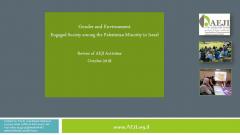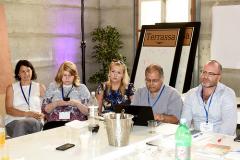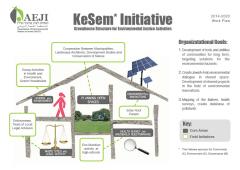Activity FieldsActivities of The Association of Environmental Justice in Israel
Gender and Environment - Engaged Society among the Palestinian Minority in Israel
Review of AEJI Activities
Association of Environmental Justice in Israel (AEJI)
| Sunday, 28-Oct-2018
The theme "Women, Environment and Gender Equality" is one of the main goals that the Association of Environmental Justice in Israel (AEJI) has placed in its activities. The topic is integrated into the three main areas of the AEJI 's activities:
1.Initiatives for research and development of tools for dealing with environmental nuisances, including gender planning, development of indices for community resilience in time of climate change and environmental deterioration, health and exposure to hazardous materials, and more;
2. Advance policy to reduce environmental inequalities, including initiating special session in Knesset at the committee for advance women status and gender equality on the Environment Day, advance of legislation on the protection of disadvantaged groups of workers that expose to environmental hazards such as Cleaning (mainly female) workers, and others.
3. Field activity at is intended to empower population groups that are socially excluded. AEJI held workshops for women in Arab society, conducted professional excursion with the participation of landscape architects and planners to raise, advance and act for implementing of planning of public space, based on the characterization of gender needs in a traditional society as a separate park for women.
In addition, AEJI is member in international forums and participates in international initiatives that draw attention to the issue of gender equality as part of a broad concept of advance environmental, climate and civil rights policies.
The following is a photographic documentation, which reviews variety of activities in the field of 'Women and Environment' that the Association for Environmental Justice has initiated, guided and takes an active part since its establishment in 2009.
gender_and__environment_aeji_revie_of_activities_2010_18_eng.pdf
Gender and Environment among the Arab minority in Israel
Conference on Environmental Governance & Democracy
Institutions, public participation and environmental sustainlability: Bridging research and capacity development
UNITAR - Yale University
| Saturday, 10-May-2008
2015 EU Israel Innovation Seminar
Social Innovation: Identifying problems - finding solutions
Alexandra Meir, EU delegaion in Israel
| Thursday, 10-Sep-2015
The Association of Environmental Justice in Israel (AEJI) participated at the "2015 EU Israel innovation Seminar" .
AEJI' Director, Carmit Lubanov, participated at the Engaged Society session, presented AEJI unique model of “Social-environment greenhouse - KESEM”.
(In Hebrew KESEM K- for community/קהילה, S- for environment/ סביבה M – for Governance/ ממשל ) .
Please see the attached file with the graphic Model and key targets and channels/pillars of activities, part of it already on process of implementation.
The Social-environmental greenhouse structure – is a platform we initiated to build Green vision in the Arab society municipalities and provide professional tools , in a way that mobilize the local community to be engaged on environmental activities and on the environmental decision making process on their communities and on regional level.
The initiative of KESEM Model of work based on our experience in frame of our Green Vision project at the Arab municipalities at the Southern Triangle region (The region between Kafr Qassem in the south to Qallanswa at the north and includes also the villages and town of Kafr Barah, Jaljulyah and Tirah).
2015_eu_israel_innovation_seminar_engaged_societies.pdf
2015 EU Israel Innovation Seminar
GreenHouse Model of Work for Leading Eco-Community change
Workplan 2014-20
Carmit Lubanov
| Thursday, 10-Sep-2015
greenhouse_kesem_model_-_aeji_work_plan_2020_eng.jpg
Environmental justice model of working plan 2014-20




